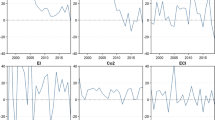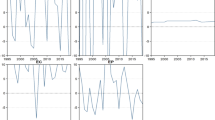Abstract
The concept of the circular economy, when viewed through an economic lens, refers to an approach that strives to reduce the utilization of resources and energy during the production process, while simultaneously maximizing the value extracted from products and materials through multiple cycles of use. In this research, the Circular Economy in Romania is analyzed from a cybernetics perspective, i.e. from the perspective of a complex adaptive system. The first part of the research approaches the stage of the transition from a linear economy to a circular economy in Romania and the design of the cybernetics system of the circular economy. In the second part, the Autoregressive Distributed Lag (ARDL) model was used to examine the long-run and the short-run causality between renewable energy as a dependent variable and its determinants such as real GDP per capita, net greenhouse gas emissions and others. The results highlight both the dependencies between renewable energy and macroeconomic factors, as well as emphasize the inclusion of the circular economy in a cybernetics system.
Access this chapter
Tax calculation will be finalised at checkout
Purchases are for personal use only
Similar content being viewed by others
References
Nica, I., Chiriță, N.: Holistic Approach of Complex Adaptive Systems. Theory, Application and Case Studies. Lambert Academic Publishing: Chisinau, Republic of Moldova (2021)
European Parliament. https://www.europarl.europa.eu/news/en/headlines/economy/20151201STO05603/circular-economy-definition-importance-and-benefits. Last accessed 19 March 2023
Scarlat, E., Chirita, N.: Cibernetica Sistemelor Economice, 3rd edn. Economica Publishing, Bucuresti (2019)
Nica, I., Chirita, N.: Course support. Bucharest University of Economic Studies, Analiza si Diagnoza Sistemelor Economice (2023)
Chirita, N., Nica, I.: Course support. Bucharest University of Economic Studies, Cibernetica Sistemelor Economice (2022)
Farzadkia, M., Mahvi, A.H., Norouzian Baghani, A., Sorooshian, A., Delikhoon, M., Sheikhi, R., Ashournejad, Q.: Municipal solid waste recycling: Impacts on energy savings and air pollution. J Air Waste Manage Assoc 71(6), 737–753 (2021). https://doi.org/10.1080/10962247.2021.1883770
Guoyan, S., Khaskheli, A., Raza, S.A., et al.: Nonlinear impact of municipal solid waste recycling and energy efficiency on environmental performance and economic growth: evidence from non-parametric causality-in-quantiles. Environ. Sci. Pollut. Res. 29, 16066–16081 (2022). https://doi.org/10.1007/s11356-021-16721-1
Marinaș, M.-C., Dinu, M., Socol, A.-G., Socol, C.: Renewable energy consumption and economic growth. Causality relationship in Central and Eastern European countries. PLoS ONE 13(10), e0202951 (2018). https://doi.org/10.1371/journal.pone.0202951
Ramos, A., Rouboua, A.: Renewable energy from solid waste: life cycle analysis and social welfare. Environ. Impact Assess. Rev. 85, 106469 (2020). https://doi.org/10.1016/j.eiar.2020.106469
Adams, S., Nsiah, C.: Reducing carbon dioxide emissions; does renewable energy matter? Sci. Total Environ. 693, 133288 (2019). https://doi.org/10.1016/j.scitotenv.2019.07.094
Chen, C., Pinar, M., Stengos, T.: Determinants of renewable energy consumption: importance of democratic institutions. Renewable Energy 179, 75–83 (2021). https://doi.org/10.1016/j.renene.2021.07.030
Omri, A., Nguyen, D.K.: On the determinants of renewable energy consumption: international evidence. Energy 72, 554–560 (2014). https://doi.org/10.1016/j.energy.2014.05.081
Oprea, S.V., Bara, A.: Edge and fog computing using IoT for direct load optimization and control with flexibility services for citizen energy communities. Knowl.-Based Syst. 228, 107293 (2021). https://doi.org/10.1016/j.knosys.2021.107293
Oprea, S.V., Bara, A.: Mind the gap between PV generation and residential load curves: maximizing the roof-top PV usage for prosumers with an IoT-based adaptive optimization and control module. Expert Syst. Appl. 212, 118828 (2023). https://doi.org/10.1016/j.eswa.2022.118828
Ghosh, S.K.: Circular Economy: Global Perspective. Springer, Singapore (2020).https://doi.org/10.1007/978-981-15-1052-6
Yuan, Z.W., et al.: The circular ecology: a new development strategy in China. J. Ind. Ecol. 10, 4–8 (2006)
Geng, Y., Zhu, Q.H., Doberstein, B., Fujita, T.: Implementing China’s circular economy concept at the regional level: a review of progress in Dalian, China. Waste Manage. 29, 996–1002 (2009)
Sage, A.P.: Cybernetics and complex adaptive systems. In: Gass, S.I., Fu, M.C. (eds.) Encyclopedia of Operations Research and Management Science. Springer, Boston, MA (2013). https://doi.org/10.1007/978-1-4419-1153-7_205
Pesaran, M.H., Shin, Y.: An autoregressive distributed-lag modelling approach to cointegration analysis. In: Econometrics and Economic Theory in the 20th Century: The Ragnar Frisch Centennial Symposium, vol. 31, pp. 371–413 (1998). https://doi.org/10.1017/CCOL0521633230.011
Pesaran, M.H., Shin, Y., Smith R.J.: Bounds testing approaches to the analysis of level relationships. J. Appl. Econometrics 16(1), 289–326 (2001). https://doi.org/10.1002/jae.616
Brown, R.L., Durbin, J., Evans, J.M.: Techniques for testing the constancy of regression relationships over time. J. Royal Stat. Soc. Series B (Methodological) 37(2), 149–192 (1975). https://doi.org/10.1111/j.2517-6161.1975.tb01532.x
Dickey, D., Fuller, W.: Distribution of the estimator for autoregressive time series with a unit root. J. Am. Stat. Assoc. 74, 427–431 (1979)
Samargandi, N., Fidrmuc, J., Ghosh, S.: Is the relationship between financial development and economic growth monotonic? Evidence from a sample of middle-income countries. World Dev. 68, 66–81 (2015). https://doi.org/10.1016/j.worlddev.2014.11.010
The Government of Romania. National Strategy for Circular Economy. https://dezvoltaredurabila.gov.ro/strategia-nationala-privind-economia-circulara-13409762. Last accessed 22 March 2023
Author information
Authors and Affiliations
Corresponding author
Editor information
Editors and Affiliations
Rights and permissions
Copyright information
© 2024 The Author(s), under exclusive license to Springer Nature Singapore Pte Ltd.
About this paper
Cite this paper
Chiriță, N., Georgescu, I. (2024). Cybernetics Analysis of the Circular Economy from Romania. In: Ciurea, C., Pocatilu, P., Filip, F.G. (eds) Proceedings of 22nd International Conference on Informatics in Economy (IE 2023). IE 2023. Smart Innovation, Systems and Technologies, vol 367. Springer, Singapore. https://doi.org/10.1007/978-981-99-6529-8_27
Download citation
DOI: https://doi.org/10.1007/978-981-99-6529-8_27
Published:
Publisher Name: Springer, Singapore
Print ISBN: 978-981-99-6959-3
Online ISBN: 978-981-99-6529-8
eBook Packages: Intelligent Technologies and RoboticsIntelligent Technologies and Robotics (R0)




